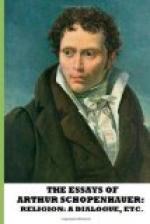The look of good sense and prudence, even of the best kind, differs from that of genius, in that the former bears the stamp of subjection to the will, while the latter is free from it.
And therefore one can well believe the anecdote told by Squarzafichi in his life of Petrarch, and taken from Joseph Brivius, a contemporary of the poet, how once at the court of the Visconti, when Petrarch and other noblemen and gentlemen were present, Galeazzo Visconti told his son, who was then a mere boy (he was afterwards first Duke of Milan), to pick out the wisest of the company; how the boy looked at them all for a little, and then took Petrarch by the hand and led him up to his father, to the great admiration of all present. For so clearly does nature set the mark of her dignity on the privileged among mankind that even a child can discern it.
Therefore, I should advise my sagacious countrymen, if ever again they wish to trumpet about for thirty years a very commonplace person as a great genius, not to choose for the purpose such a beerhouse-keeper physiognomy as was possessed by that philosopher, upon whose face nature had written, in her clearest characters, the familiar inscription, “commonplace person.”
But what applies to intellectual capacity will not apply to moral qualities, to character. It is more difficult to discern its physiognomy, because, being of a metaphysical nature, it lies incomparably deeper.
It is true that moral character is also connected with the constitution, with the organism, but not so immediately or in such direct connection with definite parts of its system as is intellectual capacity.
Hence while everyone makes a show of his intelligence and endeavors to exhibit it at every opportunity, as something with which he is in general quite contented, few expose their moral qualities freely, and most people intentionally cover them up; and long practice makes the concealment perfect. In the meantime, as I explained above, wicked thoughts and worthless efforts gradually set their mask upon the face, especially the eyes. So that, judging by physiognomy, it is easy to warrant that a given man will never produce an immortal work; but not that he will never commit a great crime.
PSYCHOLOGICAL OBSERVATIONS.
For every animal, and more especially for man, a certain conformity and proportion between the will and the intellect is necessary for existing or making any progress in the world. The more precise and correct the proportion which nature establishes, the more easy, safe and agreeable will be the passage through the world. Still, if the right point is only approximately reached, it will be enough to ward off destruction. There are, then, certain limits within which the said proportion may vary, and yet preserve a correct standard of conformity. The normal standard is as follows. The object of the intellect is to light and lead the will on its




